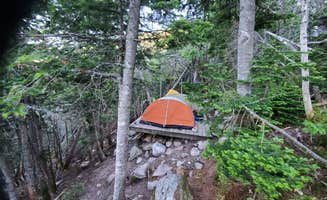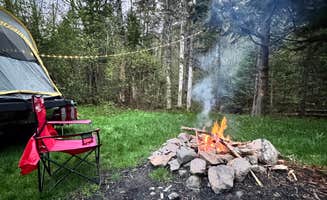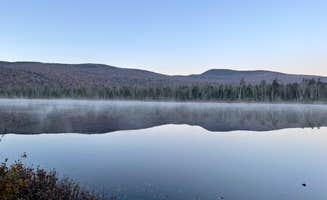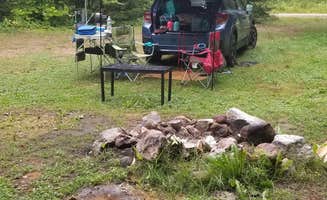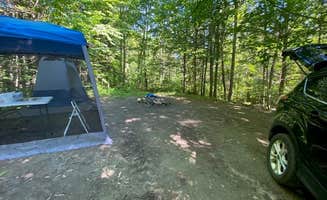Primitive camping near Bethlehem, New Hampshire offers secluded sites within the northern White Mountains region, which sits at elevations ranging from 1,400 to 4,000 feet. The area experiences dramatic seasonal changes with summer temperatures typically reaching 70-85°F during the day and dropping to 45-60°F at night. Most dispersed sites in this region remain unplowed and inaccessible during winter months when snowfall can exceed 100 inches annually.
What to do
Summit hiking trails: The Guyot Shelter area provides access to several peaks with exceptional views. One camper notes, "We got to the site, claimed our platform and hiked over to West Bond to catch a beautiful sunset." For experienced hikers, this backcountry shelter serves as an excellent basecamp for tackling multiple summits in a single trip.
Fishing in local rivers: Town Hall Road Dispersed camping areas offer excellent riverside spots for anglers. A camper reports, "There are trout in the river and if you cross and go through the woods to the right there's some great spots to explore further!" Several sites provide direct water access with room for fishing gear and camp setup.
Swimming holes: During summer months, many campers seek relief in the cool mountain waters. As one reviewer mentioned about Cherry Mountain Road Dispersed, "We stayed on site #5 because it was flat, sunny, grassy and had a little brook." These natural water features provide refreshing options after hot summer hikes.
What campers like
Seclusion between sites: At many primitive camping areas near Bethlehem, campsites offer good separation for privacy. A camper at Elbow Pond Road Dispersed Site mentions, "They have a couple different spots where you can park and walk up to your site or they have sites you can pull right up next to them." This flexibility allows for varying degrees of seclusion based on preference.
Accessibility to towns: Despite feeling remote, most dispersed camping areas maintain relatively easy access to supplies. According to one camper at Town Hall Road, "Ten minutes from grocery/gas etc in Bartlett." This convenience factor helps campers extend their stays without excessive planning.
Campfire options: Most primitive sites include established fire rings. A reviewer at Haystack Road notes, "These are my go to sites when I am in the Franconia Notch area. They have a fire pit, plenty of woods around, and are free." These amenities provide the essential backcountry camping experience while maintaining safety standards.
What you should know
Road quality considerations: Some dispersed camping areas require vehicles with higher clearance. A camper at Elbow Pond warns, "The road in is pretty rough and is not recommended for sedans or lower riding cars." Always check current conditions before departing, especially after heavy rainfall.
Site availability patterns: Weekends fill quickly at popular locations, particularly in summer and fall foliage season. At Maine Railroad Trestle, "While reservations are not required, there is a registration page on the CT River Paddler's Trail Website that they ask folx to complete just so spots don't get overcrowded." Arriving mid-week significantly improves your chances of securing preferred sites.
Tick prevalence: Multiple campers report ticks throughout the region. One camper at Maine Railroad Trestle noted, "The ticks in the field are insane! They weren't bad in the campsite but in the grass, they were epic." Proper repellent, clothing, and regular tick checks remain essential for all visitors.
Tips for camping with families
Secure site selection: For families with young children, choosing sites away from steep terrain proves safest. A camper at Haystack Road mentioned, "There are 11 options, each completely separated from the others." Sites numbered 3-7 typically offer the flattest terrain with fewer tripping hazards for small children.
Stream access for entertainment: Natural water features provide hours of entertainment for children. As one reviewer noted about Town Hall Road, "We found our spot which had some river access and it was gorgeous. It had an above and below spot which hosted our two tents." These multi-level sites create natural play zones while maintaining safety.
Fire pit availability: When camping with families, established fire rings become essential for meal preparation and evening activities. According to one camper, "Great sites. Some right on water. First come first serve, can get busy." Arriving early ensures securing sites with proper fire containment facilities.
Tips from RVers
Size restrictions: Most primitive camping near Bethlehem accommodates smaller RVs only. A Town Hall Road camper notes, "We got lucky and snagged a perfect spot 2 miles in from the entrance sign- completely level (didn't even need our leveling blocks) and big enough for our 26ft class c. Each site is different, but there were plenty that could fit a medium sized RV like ours. I wouldn't recommend a giant 5th wheel or class A to come here looking for a spot."
Solar considerations: Dense forest canopy limits solar charging capabilities. One RVer mentioned, "Heavily wooded area, so it's not so great for solar panels and probably not starlink either." Plan alternative power sources when selecting these primitive camping options.
Road width challenges: Many access roads feature limited passing zones. A camper at Town Hall Road observed, "The road is dirt, but it's hard packed and smooth, with a few dips and holes here and there. A little narrow but it's manageable." Consider arriving during daylight hours to navigate these constraints more effectively.



